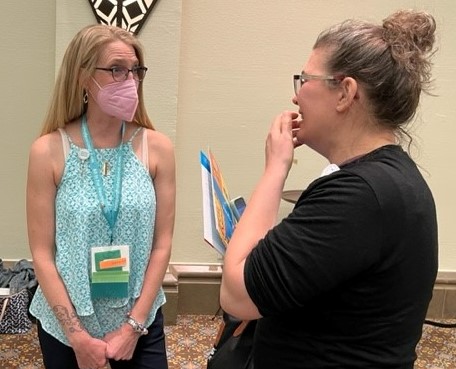Another Amazing NANT Conference in the Books

Photo credit: NANT
April 27, 2023
Marianne Boynton
Director of Client Relations
Last week I had the opportunity to attend the National Association of Neonatal Therapists (NANT) Conference in beautiful Tucson, AZ. It was two days full of meeting with passionate neonatal therapists, listening to the needs and suggestions for future continuing education courses, and talking with leading experts about recent NICU trends. And on top of all the excitement the conference elicits, you can’t beat the stunning backdrop of a setting Tucson sky!

Shanna Semmler
As a professional partner with NANT, it’s such a privilege to have a dedicated event to converse with this incredibly devoted, passionate group of therapists. Their drive to deliver the highest quality of care for the tiniest population and their families is inspiring, and it’s easy to walk away from this conference reinvigorated and eager to provide this community with the best possible training to further their learning in the neonatal field.

Marianne Boynton, Kati Knudsen, Robin Glass and Holly Schifsky
Our ERI Faculty
It was an honor to have some esteemed ERI faculty stop by our exhibit booth and meet and greet with attendees throughout the two days. This gave attendees the opportunity to offer future topic suggestions, confer with leading NICU experts, ask questions, and discuss emerging neonatal topics. Everyone was so warm and welcoming, and I really enjoyed getting the chance to reconnect with old friends and meet new ones!
Some of the faculty who stopped by included Holly Schifsky, Robin Glass, Lynn Wolf, Shanna Semmler and Katie Knudsen. We can’t thank them enough for generously sharing their time and expertise at the booth – the lines to chat with these experts were deep and we loved hearing all they had to say!

Anjanette Lee
Did You Know About Our Loyalty Program?
Of course, we had to have some fun with our raffles and giveaways. We made sure everyone got plenty of goodies, and those who visited the booth were entered to win either discounted or free ERI courses (including a special NANT only discount). We had many entrants, so a big congratulations to our raffle winners: Kim Richardson, Kelsey Hales, Jaclyn Rogowski, Bianca Coulson, and Mindy Delaney. Speaking of special offers, did you know that we have a loyalty rewards program? Some examples include group discounts, first time registrant discounts, and even $100 off if you’re registering for your 4th ERI course!

A great way to end the day
And lastly, the weekend wouldn’t be complete without some type of western themed event. After a day filled with meet and greets, education and trainings, attending a Wild West themed dinner full of cowboy hats and boots, and surrounded by Tucson’s beautiful scenery was the perfect way to kick back and relax.
Our Commitment to You
Coming off of NANT13 just inspires us even more to continue to best equip this passionate community with the necessary tools needed to enhance their professional skills. Whether learning on-demand, via live webinar, or at an in-person event, we are dedicated to providing you with unparalleled educational offerings from some of the leading experts in the neonatal field. We are so looking forward to connecting with those we met this weekend and serving this tireless group of therapists so that they may continue to improve the lives of their tiny patients and their families!
Check in with us throughout the year as we continue to add more NICU related courses to our ever-growing library. Questions? Contact us at info@educationresourcesinc.com or call 800-487-6530.
 HAPPY SPRING!
HAPPY SPRING!
 Dr. Benson has worked in pediatrics for more than 30 years, with extensive experience in school-based practice and as an educational consultant for schools and families. She is certified to administer the Sensory Integration and Praxis Test, is a certified infant massage instructor and is trained in Neurodevelopmental Treatment for children with cerebral palsy.
Dr. Benson has worked in pediatrics for more than 30 years, with extensive experience in school-based practice and as an educational consultant for schools and families. She is certified to administer the Sensory Integration and Praxis Test, is a certified infant massage instructor and is trained in Neurodevelopmental Treatment for children with cerebral palsy. Join Dr. Benson for a new CEU learning opportunity!
Join Dr. Benson for a new CEU learning opportunity! On-demand courses offer many key benefits, with the top being flexibility. Recorded from live webinars, participants are able to view the content at a time and place that best meets the demands of their busy professional and personal lives. Pause, rewind, or stop and start the course at any point…study at your own pace! The recordings also allow for the participant to learn from an interactive audience, as the conversations between faculty and past participants are included in the on-demand video.
On-demand courses offer many key benefits, with the top being flexibility. Recorded from live webinars, participants are able to view the content at a time and place that best meets the demands of their busy professional and personal lives. Pause, rewind, or stop and start the course at any point…study at your own pace! The recordings also allow for the participant to learn from an interactive audience, as the conversations between faculty and past participants are included in the on-demand video.  Learn more from ERI
Learn more from ERI




